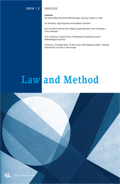|
Vrijwel alle rechtenstudenten krijgen vroeg of laat in hun studie de opdracht om eens een kijkje te nemen bij de rechtbank. Er is echter niet of nauwelijks literatuur over hoe ze dat zouden kunnen aanpakken. Dit artikel beoogt in die leemte te voorzien. Het doel is om studenten methodologische bagage mee te geven, waarmee een observatieopdracht op een hoger niveau kan worden getild. Promovendi of andere onderzoekers die observatieonderzoek willen verrichten, kunnen daar ook hun voordeel mee doen. |

| Article |
|
| Authors | Nienke Doornbos |
| AbstractAuthor's information |
| Article |
|
| Authors | Johan Mr.dr. Wolswinkel |
| AbstractAuthor's information |
|
Public law is sometimes said to deal with distributive justice. Such allocation issues are at least very dominant when public authorities grant only a limited number of public rights (authorizations, subsidies, etc.) and the number of applicants exceeds this maximum. The characteristics common to these ’limited public rights’ raise the question whether there are some general allocation rules applying to any allocation of limited public rights. This article shows how economic allocation theory can be helpful in constructing general allocation rules as a corollary of general legal principles. Allocation theory turns out to provide for general concepts and results clarifying general allocation rules and revealing mutual connections. Extending this allocation perspective from limited public rights to public law in general requires the hidden allocation issues in public law to be unveiled. |
| Article |
|
| Authors | Dr. Antoinette Muntjewerff |
| AbstractAuthor's information |
|
In this article the Think-Aloud Method, a method used in problem solving research in Psychology, is used in legal research to gather data on how novices, expert beginners and experts read, structure and analyse legal decisions. In the Dutch legal system decisions by judges are a major source of law. So it is important that law students learn to read, structure and analyse legal decisions. However, reading and understanding a decision does not go without saying, it has to be learned. The data we gather using the Think-Aloud Method are used to improve instruction to support the effective and efficient learning of comprehending legal decisions. We describe the Think-Aloud Method, our experimental design and our approach for analysing the protocols. |
| Article |
|
| Authors | Urszula Jaremba and Elaine Dr. Mak |
| AbstractAuthor's information |
|
This article addresses the problem of qualitative interviewing in the field of legal studies, and more precisely the practice of interviewing judges. In the last five years the authors of this article conducted two different research projects which involved interviewing judges as a research method. In this article the authors share their experience and views on the qualitative interviewing method, and provide the reader with an overview of the ‘ins’ and ‘outs’ attached to this tool, but also its advantages and disadvantages. |
| Artikel |
|
| Authors | Luiz Silveira |
| Abstract |
|
This article shows that the debate about the possibility and desirability of a rigid distinction between discovery and justification is being muddled because of differences and ambiguities in the way that different writers use the terms ‘discovery,’ ‘justification,’ and related terms. The article argues that merely distinguishing between ‘discovery’ and ‘justification’ is not precise enough, and that we should make a distinction between different elements within each of these contexts. I propose a six-fold classification, through which we can identify reasons, acts, and processes that play a role both in the context of discovery and in the context of justification. This six-fold classification enables us to move forward from debating whether discovery and justification can be rigidly separated, towards articulating how each element (reasons, acts, and processes) has a role to play in each of the contexts (discovery and justification), and how these elements and contexts are related. |
| Redactioneel |
|
| Authors | Sanne Taekema |
| Artikel |
|
| Keywords | methodological challenges, doctrinal legal inquiry, source-usage, methodology, method |
| Authors | Mr. Marnix Vincent Roderick Snel LLM, MA |
| AbstractAuthor's information |
|
This article provides an overview of the methodological challenges that scholars are confronted with in relation to use of legislation, case law and literature commentaries within doctrinal legal inquiry. Therefore it employs a systematic literature review and a supplementary explorative expert-consultation among legal scholars of Tilburg University. Although the scope of the research is still limited, it shows that doctrinal legal inquiry is subjected to more and other methodological challenges surrounding the source-usage than one might expect. This insight may contribute to the further development of the meta-discipline ’law and methodology’ and simultaneously allows for more methodological awareness among doctrinal legal scholars. |


